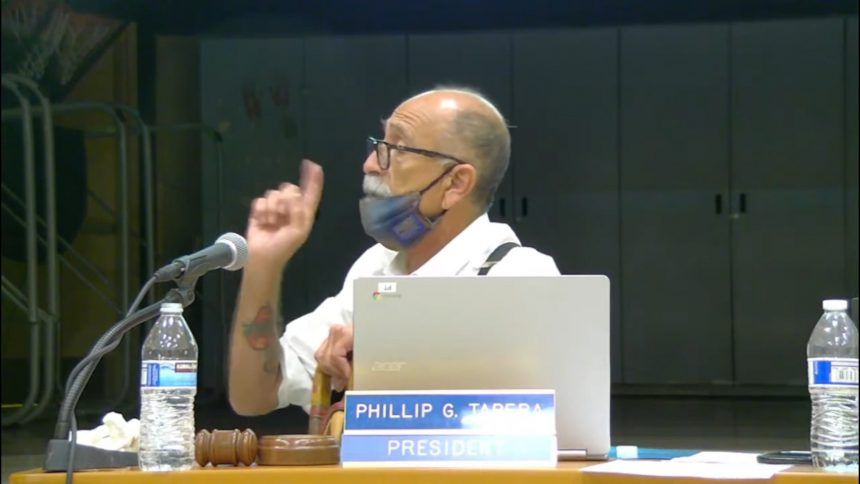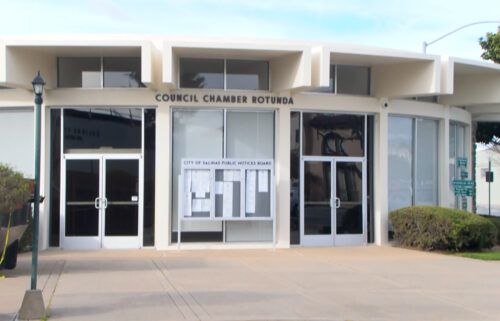Parents get heated over SUHSD ethnic studies curriculum at board meeting Tuesday

SALINAS, Calif. (KION) Passionate words and frustrated parents dominated much of the start of the Salinas Union High School District's board meeting for over 40 minutes on Tuesday.
It is all centering around the district's goal of implementing ethnic studies as a graduation requirement starting this coming school year for all schools.
The board last night decided to, in part, refine the ethnic studies curriculum to better emphasize local histories and the history of the ethnic studies movement. Some themes that will be covered include things like indigenous and active ancestral roots, colonialism and genocide and transformative resistance.
While proponents of the ethnic studies requirement believe is is an important part of diversity education for students, some are worried the program will lead to racial division between white students and minorities.
While both sides, parents and board members, all seemed to agree that racial unity and peace is something that should be strived for in society, the issue arises in what exactly this ethnic studies curriculum will teach students and what it will lead to.
"You're also including a chant to the Black Lives Matter, a unity chant. Since when did public education become a political activist organization?" said Kelly, who commented during the board meeting on Tuesday.
"This board has become an activist group and approved an agenda that is so clearly rooted in racism that there is no other options for you other than to step down, as you are individually racist to your core," said another man during public comment.
Some parents fear what students will actually be learning is something called Critical Race Theory. The Encyclopedia Britannica says, "Critical race theorists hold that the law and legal institutions in the United States are inherently racist insofar as they function to create and maintain social, economic, and political inequalities between whites and nonwhites, especially African Americans."
The district board president, Phillip Tabera, strongly denies students are being taught CRT. In a statement, the district says:
"There seems to be misconceptions about the Ethnic Studies curriculum and that it is solely based on Critical Race Theory (CRT). Nowhere in our curriculum do we hold that people are inherently victims or oppressors. The District worked closely with teachers and university professors to develop our Ethnic Studies research-based curriculum and aligned it to standards. We are committed to creating learning opportunities that deepen students' understanding of themselves and their community. Through this, students will gain the knowledge, skills, and dispositions necessary for transformational change through a positive image of self, community, and critical hope for a more just and equitable world."
Community members are not convinced, however.
"Our children grow up together and have friendships and people that they love and trust, who are of different nationalities, said one elderly woman during public comment. "And then they're being told with these new CRT requirements that they're the oppressor and the other one's the victim."
"We should be doing the best that we can to inspire the next generation to continue to love this country and love each other, not hate each other," said Gabriel Williams, another public commenter.
KION tried reaching out to every single board member in the SUHSD, but did not hear back in time for the story. KION's Josh Kristianto spoke with Tabera over the phone, and while he did not want to be interviewed for the story, he stands by his decision to vote in favor of the ethnic studies course.
The SUHSD had more to say in the statement they sent. It's presented in its entirety below:
"The District approved a year-long Ethnic studies course as an elective in 2018 after five years of debate and dialogue that involved several levels of stakeholder engagement. The course followed the Ethnic Studies Model Curriculum adopted by the State Board of Education on March 18, 2021.
A 2014 Stanford Study documented that participation in ethnic studies curriculum improved student’s attendance, GPA and credit earning. When all students are exposed to different and even contradictory perspectives, it teaches skills such as perspective-taking, abstraction and evidence-based argumentation. These are some of the basic components of critical thinking skills that are infused within state learning standards across the nation. Ethnic Studies benefits all students and brings communities together to develop a common understanding of the diverse cultures that comprise society.
In 2019, the board approved a semester-long ethnic studies graduation requirement for all students, beginning with the freshman class of 2024. The course curriculum was approved in April 2020. The board considered all stakeholder input, which included teachers, parents, students and board input, before it approved the curriculum. The District began offering the semester-long ethnic studies course this year, for the 2020-2021 school year, to our first group of freshmen.
At last night’s regular meeting, the Board approved action for an organization to provide professional development for teachers that includes reviewing the curriculum and discussing supplemental materials and resources for students in our ethnic studies classes. However, the specific complaints were related to the Critical Race Theory framework.
There seems to be misconceptions about the Ethnic Studies curriculum and that it is solely based on Critical Race Theory (CRT). Nowhere in our curriculum do we hold that people are inherently victims or oppressors. The District worked closely with teachers and university professors to develop our Ethnic Studies research-based curriculum and aligned it to standards. We are committed to creating learning opportunities that deepen students' understanding of themselves and their community. Through this, students will gain the knowledge, skills, and dispositions necessary for transformational change through a positive image of self, community, and critical hope for a more just and equitable world.
While the board was surprised by the complaints and concerns regarding the curriculum, it welcomes our community to have open dialogue about how to create the most optimal learning environment for all of our students.
--
Marcos Cabrera
SUHSD Director of Communications"
PREVIOUS STORY: Multiple parents spoke out Tuesday night against the Salinas Union High School District's board agenda item concerning the ethnic studies curriculum being planned out for the next school year.
The Memorandum of Understanding (MOU) between R. Tolteka Cuauhtin, a prominent ethnic studies consultant, and the SUHSD is meant to spearhead the "implementation of offering Ethnic Studies as a graduation requirement to all students in the academic school year of 2021-2022."
The MOU, which appeared as a consent item in the board agenda, passed. To read the agenda item itself, click here.
KION's Josh Kristianto will have more tonight at 5 and 6 p.m.


